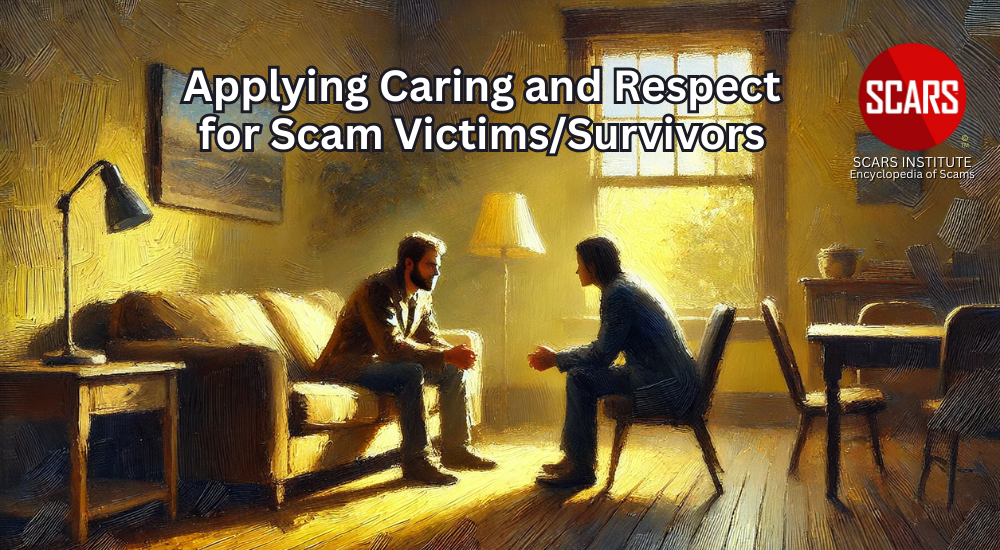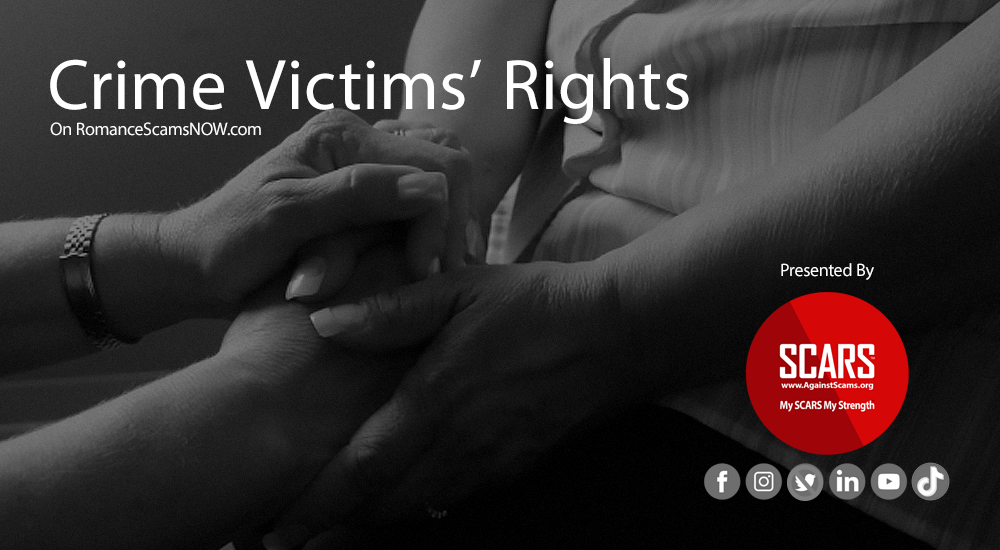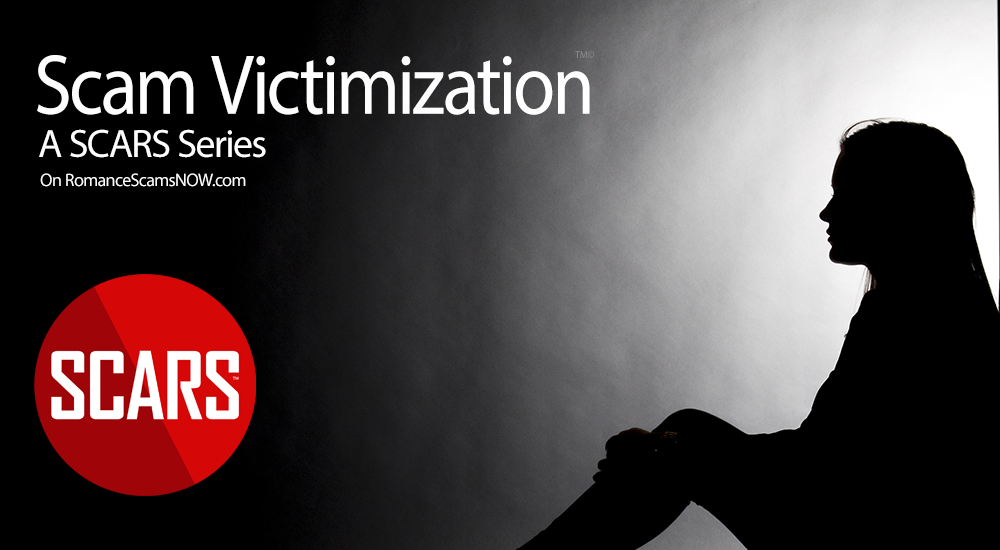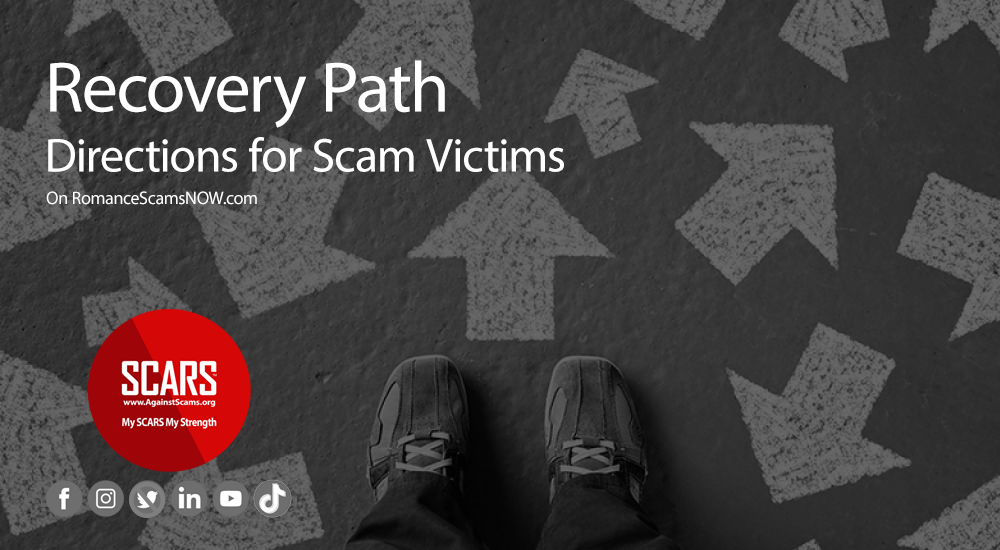
SCARS Institute’s Encyclopedia of Scams™ Published Continuously for 25 Years

What Does Recovery Mean For A Scam Victim?
What Does It Mean to Be “In Recovery?”
In this article, we are going to talk about recovery, as in recovery after a scam
What Does It Mean To Recover?
In Our Context We Mean That Recovery Is A Process
However, because scams are complex in that they involve psychological traumatization (as a victim), involve addiction (as in the mental addiction to the scam); and the financial difficulty of both financial recovery and reconciliation with the impact this caused on your life – we will explore parts of each of these.
In this article, we will be using two words: Victim and Survivor
These are to help delineate each stage of recovery. We view a victim as someone who has had the scam happen to them and is working to regain some measure of healthy control. A Survivor is someone who has regained a sense of balance and real control in their life. Being a Survivor does not mean (in our view) that you have recovered, but that you have taken control of your recovery and are actively working on it towards a positive goal. Of course, being a Survivor also means that you have come out the other end and the scam is no longer a part of your daily life.
According to: Dr. Lance Dodes, M.D., a former professor of psychiatry at Harvard Medical School.
This Phrase “Recovery” Is Sometimes More Confusing Than Helpful
Many words in the addiction field have been tossed around for years without being clearly defined or even being meaningful. “Recovered,” “recovery” and “being in recovery” are examples. In most of life, “being in recovery” means a person is making progress even though s/he isn’t “cured.” Sometimes it is used as a synonym for “being in remission” — indicating relapse is a clear possibility (as with being “in recovery” from cancer), while other times it means “on the path to a definite cure” — as in being in recovery after surgery. Neither of these usages is problematic, so long as we all understand what is meant. But in the addiction field, the term has been used in a third way in 12-step programs. There, it is traditional for people to refer to themselves as “in recovery,” no matter how long they have been abstinent from their addictive behavior and no matter how well they are doing in life. Partly, this is the same as saying they are “in remission,” based on the idea they can always suffer a relapse. But too often, being “in recovery” has come to mean something different: that they are on what they declare is the right path. When used this way, folks are condemned as not “in recovery” if they drop out of 12-step programs or are thought to not be “working the program” adequately. When “recovery” is used this way, it is more a political statement than a factual or medical one.
People suffering with addictions should ignore the agendas of anyone attempting to define whether they are “recovering” or “recovered.” They would be better off thinking of their addiction as a repetitive behavior that arises with great force at key moments when they feel overwhelmingly helpless. These moments can be predicted and avoided once they know just what their emotional vulnerabilities are. However, there will always be some risk of becoming overwhelmed, and responding with the old behavior. To this extent, it is true that anyone with addictive behavior is never “cured.” But we are all at risk of repeating old behaviors (in my field it’s called “regressing”), whether these old behaviors are addictions or anything else that used to be part of our solution to life. That’s not a specific feature of addictions, it’s just the way humans are. It makes no more sense to label oneself as “recovering” forever from an addiction, than it does for a person who used to be depressed to forever be “recovering” from depression, or a person who has been cancer-free for 15 years to still define herself as a cancer patient. It certainly makes no sense to define “recovering” in terms of whether you are in one treatment approach or another. Addiction is a terrible symptom, but it is not who you are, and once you understand how it works emotionally in you so it doesn’t sneak up on you, there is no reason to dwell on what words you use.
Source: PsychologyToday »
Dr. Dodes makes a superb point in the meaninglessness of using the term as a solution in and of itself. We view recovery as a process of learning that can be accomplished on your own, in a support group, in therapy or counseling, or with the help of family and friends.
We view it as a statement that something seems broken and that there are changes needed in order to live a happy life. There are some generalized changes that all victims should go through – just to be safe – and the rest will be unique per person.
SCARS has several approaches to recovery to work for different kinds of victims, and some even after they become survivors.
The SCARS Approaches:
- Self Recovery – following the SCARS Steps approach
- Support Group peer-based recovery – allowing yourself to become part of a compassionate community of fellow victims and survivors
- Discussion Group peer-based recovery – allowing yourself to be part of a shared goal community to help identify your needs for recovery
- Educational Commentary recovery – participating as an independent victim in multiple ways while learning what happened and allowing you time to explore recovery options
SCARS’ RSN Division provides all four of these recovery solutions through their website, social media, and more. In each approach, we endeavor to offer victims assistance and support in any way the victim can accept. We do not offer therapy or counseling, but we offer knowledge, communications, and peer-to-peer support structures.
Of course, this is complicated because there are phases of recovery too.
Two Requirements
In order to begin the process of recovery, you are required to accept two fundamental things:
-
Acceptance of the truth & reality
-
Acceptance of your need for recovery
Accepting the truth is about accepting that you are the victim of a crime – that is the first part; but then accepting reality. Reality means that you are willing to learn the true situation regardless of your biases, expectations, and assumptions. For most scam victims this will be quite different than what they initially believed.
Accepting your need for recovery is critical in your success. You have to accept that you need help and that there is no shame in doing that. No one can really help you if you cannot accept this important fact.
The Overall Path
Phases Of Scam Victim Recovery
Each person copes with trauma in a different way, depending on their circumstances. We cannot tell you exactly how you will or should feel if you have been scammed (or other acts of violence either physical or psychological), but we can tell you what we have learned from other scam survivors. By describing their feelings and coping mechanisms, we hope to offer you strength and help you understand what you might be going through.
How long your journey to recovery takes will depend on your situation and how supportive the people around you are, if you have joined a real support group, have sought counseling or some form of formal therapy, or if you have gone the other approach of listening to amateurs that will lead you down the wrong path.
Remember That Not All Psychological Issues Can Be Helped Using Our Approaches, Some Require Professional Mental Health Assistance. If You Are Worried About Negative Feelings Or Thoughts, We Recommend That You Seek Help.
It’s important to remember that there are people who can and will help you. People such as counselors, social workers, psychologists, clinic staff. or even a family member or a friend that you can trust are there to help you. We are also here to help you in whatever we offer. We (SCARS) are trained and registered Crime Victims Advocates to provide Crime Victims Assistance and Support. We have gone through professional training for this.
The following phases of recovery are guidelines and they do not necessarily follow on from one another chronologically; different people may move backward, forward or between phases as they work through their trauma.
Acute Phase
Immediately after the scam is discovered, most victims feel shocked, in dismay, fear, panic and/or anger. Some victims show this by appearing numb or dazed, others will be openly upset. As a scam victim, you are likely to react this way in the first few hours, days, and/or weeks after the scam. This phase, known as the Acute Phase, will usually not last longer than two to three months after the scam ends. Another element of the Acute Phase is being unable to talk about the scam. You may have nightmares and feel shocked, guilty, afraid, ashamed, powerless, angry, depressed, and/or afraid of strangers or connections with anyone new. In fact, the fear of strangers can actually help prevent you from obtaining support in that you are afraid to trust anyone.
The Acute Phase may also lead you into other unsafe behaviors without proper consideration of who you are listening to. During this phase, you may also express panic and seek out anyone that claims they can save you – usually with poor results. This is the phases where your judgment is typically at its worst.
Outward Adjustment Phase
During this phase, most victims will try to carry on with their lives as normal to try and assure themselves that they can cope; they’re testing their ability to survive the experience. Means of coping may include pretending the incident didn’t happen or ignoring thoughts and feelings related to the scam. Obviously, that is not going to work.
During this phase, you may not feel open to counseling. You may feel less troubled than during the Acute Phase, but you may find that you don’t want to speak about the scam very much. Be aware that this might be difficult for those close to you who wish to be helpful. They may feel frustrated by your unwillingness to discuss the scam (if they know about it) or they may put pressure on you to behave differently (because they do not know what happened and how you are feeling). You might find that during this phase what you really want is for people to ‘let you be’. Sadly, that is not what you need, because this can extend recovery significantly
Integration Phase
During the Integration Phase, scam victims may feel depressed or anxious or they may wish to talk. The nightmares and feelings of shock, guilt, fear, shame, powerlessness, anger, depression, and fear of being scammed characterized by the Acute Phase may return. We typically see this at about 6 months after the scam has ended – we call this a “Mid-Recovery Crisis”
Many victims in this phase believe that their feelings mean they have serious emotional problems or that they are going mad. Victims may find they cannot function as they used to and they may begin to think about the scam & scammer more. This is a good time to go for counseling or make sure you are in a competent support group – and you are participating for your benefit because this is where and when you as a scam victim will be most receptive to support and reassurance.
Renewal (Survivor) Phase
This is the time when you will probably begin to make sense of the trauma and you will begin to feel safer in the world. During this phase, your symptoms should ease off or some even disappear. Though financial effects may cause periods of crisis which can last for years. The memory of the scam & scammer will not have the same effect on you. You will probably start to feel good about life again. You may still feel emotional at times, but overall you will feel more in control and able to move forward. This is where you can start to think of yourself as a Survivor.
There Is No Specific Or Set Way To Recover – Your Journey Is Unique To You
With The Right Kind Of Support, You Can Recover From Being Scammed
Financial Recovery
Unfortunately, it is impossible to really explore the financial impacts on scam victims. Some will have lost a small amount that will not be life-changing, while others will have lost everything and become homeless. Each victim will have the psychological trauma to recover from but also the financial effects. The financial consequences can be severe and inhibit a victim’s ability to recover.
Let us just say that even though there may be real difficulty financially for a victim, it is important to deal with the psychological effects first since without these financial solutions will be hard to realize and enact.
What Does It Mean To Recover From A Scam?
As you move through the Recovery Phases in time you will get to the Renewal Phase, but what does that actually mean for most Scam Victims turned into Survivors?
First, recovery does not mean a return to who you were. It means achieving a life where you can go forward and leave the events of the past mostly in the past. Yes, you will be forever changed, but you can come out the other end a smarter and stronger person. You will be a survivor.
Eventually, even the idea of scams that you spent so much time obsessing over will become someone boring. Hopefully, that will not be true of other victims though. As you recover we hope that you pay it forward and help those that are where you were in the early stages of your recovery.
A big part of this process of recovery is allowing others to help guide us along the path to stability, but it is also recognizing those that are toxic from those that truly can help. It is not easy, and people frequently give in to rage and hate and they fall out. Some fall into hate groups because it matches their mood at that time, and this also derails their recovery. Our hope is that you will not fall off the recovery path permanently as so many do, continuing to live a life of anger or despair, but that you find the right way to return to happiness.
It takes work and commitment, but almost every victim can become a survivor. Note we said “can”, sadly less than half actually do.
If You Ever Feel Yourself In Need Of Someone To Talk To
24/7 Please Call This Number:
1-800-273-TALK (8255)If You Do Not Live In North America, Click Here For Other Hotline Numbers
Footnote: the Phases are based upon similar phases for sexual assault victims adapted to scam victims’ needs.
SCARS RECOMMENDS LOCAL TRAUMA COUNSELING FOR ALL RELATIONSHIP SCAM VICTIMS:
Regardless of your self-awareness, or perceived state, trauma is a ticking timebomb. A scam victim may think they are just fine, but months or years later it will have a significant impact on your emotional health and future relationship.
The failure of a scam victim to get counseling is not a sign of strength but of denial. Trauma counseling is not hard to find, though most counselors are not fully aware of this type of crime.
However, if they are a certified trauma counselor then they can focus on the impact and ignore the scam details – since those are not as important as the damage it caused. In fact, a victim that insists on talking about the details of a scam, such as a scammer’s dialog, the promises, or negligence is exhibiting typical signs of trauma that should be addressed through counseling. Inappropriate focus is a clear sign of trauma and the need for real care.
If you are looking for local trauma counselors please visit https://www.psychologytoday.com/us/therapists/trauma-and-ptsd
Remember
Remember that SCARS is a professional crime victims’ assistance organization relying on our team’s 30 years of experience, and our experience with over 7 million scam victims. To learn more about what SCARS is and who are its leadership visit www.AgainstScams.org
We are not a mental health care provider. We do not provide counseling or therapy. We refer you to certified trauma counselors or therapists for that.
We are not responsible for your failure to seek appropriate care.
The information that we present about the psychology of scams, trauma, and all factors associated with your emotional health are for “entertainment” purposes only (the lawyers say we have to say that).
We cannot fix you, only you can do that. We are just here as a guide to a path for recovery.
TAGS: SCARS, Psychology of Scams, Scam Recovery, Information About Scams, Anti-Scam, Scams, Scammers, Fraudsters, Cybercrime, Crybercriminals, Romance Scams, Scam Victims,
PLEASE SHARE OUR ARTICLES WITH YOUR FRIENDS & FAMILY
HELP OTHERS STAY SAFE ONLINE – YOUR KNOWLEDGE CAN MAKE THE DIFFERENCE!
THE NEXT VICTIM MIGHT BE YOUR OWN FAMILY MEMBER OR BEST FRIEND!
By the SCARS™ Editorial Team
Society of Citizens Against Relationship Scams Inc.
A Worldwide Crime Victims Assistance & Crime Prevention Nonprofit Organization Headquartered In Miami Florida USA & Monterrey NL Mexico, with Partners In More Than 60 Countries
To Learn More, Volunteer, or Donate Visit: www.AgainstScams.org
Contact Us: Contact@AgainstScams.org
-/ 30 /-
What do you think about this?
Please share your thoughts in a comment below!
Table of Contents
- What Does It Mean to Be “In Recovery?”
- In Our Context We Mean That Recovery Is A Process
- In this article, we will be using two words: Victim and Survivor
- This Phrase “Recovery” Is Sometimes More Confusing Than Helpful
- Phases Of Scam Victim Recovery
- Remember That Not All Psychological Issues Can Be Helped Using Our Approaches, Some Require Professional Mental Health Assistance. If You Are Worried About Negative Feelings Or Thoughts, We Recommend That You Seek Help.
- Acute Phase
- Outward Adjustment Phase
- Integration Phase
- Renewal (Survivor) Phase
- There Is No Specific Or Set Way To Recover – Your Journey Is Unique To You
- With The Right Kind Of Support, You Can Recover From Being Scammed
- Financial Recovery
- What Does It Mean To Recover From A Scam?
- If You Ever Feel Yourself In Need Of Someone To Talk To
24/7 Please Call This Number:
1-800-273-TALK (8255) - SCARS RECOMMENDS LOCAL TRAUMA COUNSELING FOR ALL RELATIONSHIP SCAM VICTIMS:
- Remember
- PLEASE SHARE OUR ARTICLES WITH YOUR FRIENDS & FAMILY
- By the SCARS™ Editorial Team
Society of Citizens Against Relationship Scams Inc. - The Issue Of Race In Scam Reporting
Click Here To Learn More!
LEAVE A COMMENT?
Recent Comments
On Other Articles
- Arwyn Lautenschlager on Love Bombing And How Romance Scam Victims Are Forced To Feel: “I was love bombed to the point that I would do just about anything for the scammer(s). I was told…” Feb 11, 14:24
- on Dani Daniels (Kira Lee Orsag): Another Scammer’s Favorite: “You provide a valuable service! I wish more people knew about it!” Feb 10, 15:05
- on Danielle Delaunay/Danielle Genevieve – Stolen Identity/Stolen Photos – Impersonation Victim UPDATED 2024: “We highly recommend that you simply turn away form the scam and scammers, and focus on the development of a…” Feb 4, 19:47
- on The Art Of Deception: The Fundamental Principals Of Successful Deceptions – 2024: “I experienced many of the deceptive tactics that romance scammers use. I was told various stories of hardship and why…” Feb 4, 15:27
- on Danielle Delaunay/Danielle Genevieve – Stolen Identity/Stolen Photos – Impersonation Victim UPDATED 2024: “Yes, I’m in that exact situation also. “Danielle” has seriously scammed me for 3 years now. “She” (he) doesn’t know…” Feb 4, 14:58
- on An Essay on Justice and Money Recovery – 2026: “you are so right I accidentally clicked on online justice I signed an agreement for 12k upfront but cd only…” Feb 3, 08:16
- on The SCARS Institute Top 50 Celebrity Impersonation Scams – 2025: “Quora has had visits from scammers pretending to be Keanu Reeves and Paul McCartney in 2025 and 2026.” Jan 27, 17:45
- on Scam Victims Should Limit Their Exposure To Scam News & Scammer Photos: “I used to look at scammers photos all the time; however, I don’t feel the need to do it anymore.…” Jan 26, 23:19
- on After A Scam, No One Can Tell You How You Will React: “This article was very informative, my scams happened 5 years ago; however, l do remember several of those emotions and/or…” Jan 23, 17:17
- on Situational Awareness and How Trauma Makes Scam Victims Less Safe – 2024: “I need to be more observant and I am practicing situational awareness. I’m saving this article to remind me of…” Jan 21, 22:55
ARTICLE META
Important Information for New Scam Victims
- Please visit www.ScamVictimsSupport.org – a SCARS Website for New Scam Victims & Sextortion Victims
- Enroll in FREE SCARS Scam Survivor’s School now at www.SCARSeducation.org
- Please visit www.ScamPsychology.org – to more fully understand the psychological concepts involved in scams and scam victim recovery
If you are looking for local trauma counselors please visit counseling.AgainstScams.org or join SCARS for our counseling/therapy benefit: membership.AgainstScams.org
If you need to speak with someone now, you can dial 988 or find phone numbers for crisis hotlines all around the world here: www.opencounseling.com/suicide-hotlines
A Note About Labeling!
We often use the term ‘scam victim’ in our articles, but this is a convenience to help those searching for information in search engines like Google. It is just a convenience and has no deeper meaning. If you have come through such an experience, YOU are a Survivor! It was not your fault. You are not alone! Axios!
A Question of Trust
At the SCARS Institute, we invite you to do your own research on the topics we speak about and publish, Our team investigates the subject being discussed, especially when it comes to understanding the scam victims-survivors experience. You can do Google searches but in many cases, you will have to wade through scientific papers and studies. However, remember that biases and perspectives matter and influence the outcome. Regardless, we encourage you to explore these topics as thoroughly as you can for your own awareness.
Statement About Victim Blaming
SCARS Institute articles examine different aspects of the scam victim experience, as well as those who may have been secondary victims. This work focuses on understanding victimization through the science of victimology, including common psychological and behavioral responses. The purpose is to help victims and survivors understand why these crimes occurred, reduce shame and self-blame, strengthen recovery programs and victim opportunities, and lower the risk of future victimization.
At times, these discussions may sound uncomfortable, overwhelming, or may be mistaken for blame. They are not. Scam victims are never blamed. Our goal is to explain the mechanisms of deception and the human responses that scammers exploit, and the processes that occur after the scam ends, so victims can better understand what happened to them and why it felt convincing at the time, and what the path looks like going forward.
Articles that address the psychology, neurology, physiology, and other characteristics of scams and the victim experience recognize that all people share cognitive and emotional traits that can be manipulated under the right conditions. These characteristics are not flaws. They are normal human functions that criminals deliberately exploit. Victims typically have little awareness of these mechanisms while a scam is unfolding and a very limited ability to control them. Awareness often comes only after the harm has occurred.
By explaining these processes, these articles help victims make sense of their experiences, understand common post-scam reactions, and identify ways to protect themselves moving forward. This knowledge supports recovery by replacing confusion and self-blame with clarity, context, and self-compassion.
Additional educational material on these topics is available at ScamPsychology.org – ScamsNOW.com and other SCARS Institute websites.
Psychology Disclaimer:
All articles about psychology and the human brain on this website are for information & education only
The information provided in this article is intended for educational and self-help purposes only and should not be construed as a substitute for professional therapy or counseling.
While any self-help techniques outlined herein may be beneficial for scam victims seeking to recover from their experience and move towards recovery, it is important to consult with a qualified mental health professional before initiating any course of action. Each individual’s experience and needs are unique, and what works for one person may not be suitable for another.
Additionally, any approach may not be appropriate for individuals with certain pre-existing mental health conditions or trauma histories. It is advisable to seek guidance from a licensed therapist or counselor who can provide personalized support, guidance, and treatment tailored to your specific needs.
If you are experiencing significant distress or emotional difficulties related to a scam or other traumatic event, please consult your doctor or mental health provider for appropriate care and support.
Also read our SCARS Institute Statement about Professional Care for Scam Victims – click here to go to our ScamsNOW.com website.


![What Does Recovery Mean For A Scam Victim? [Updated] cognitions and trauma Cognition and Trauma - The Impact Of Relationship Scams - UPDATED 2024 - on SCARS Institute Encyclopedia of Scams RomanceScamsNOW.com](https://romancescamsnow.com/wp-content/uploads/2020/12/cognitions-and-trauma.png)
![What Does Recovery Mean For A Scam Victim? [Updated] what are you thinking What Does Recovery Mean For A Scam Victim? [Updated] what are you thinking](https://romancescamsnow.com/wp-content/uploads/2018/09/what-are-you-thinking-x.jpg)
![What Does Recovery Mean For A Scam Victim? [Updated] scam victims road to recovery2 scam-victims-road-to-recovery](https://romancescamsnow.com/wp-content/uploads/2018/10/scam-victims-road-to-recovery2.png)
![What Does Recovery Mean For A Scam Victim? [Updated] come and join 2 SCARS Institute Scam Survivor's Community portal banner](https://romancescamsnow.com/wp-content/uploads/2025/12/come-and-join-2.png)
![What Does Recovery Mean For A Scam Victim? [Updated] road to recovery The Path To Recovery](https://romancescamsnow.com/wp-content/uploads/2020/09/road-to-recovery.png)
![What Does Recovery Mean For A Scam Victim? [Updated] romance scam zones The Scam Recovery Zones](https://romancescamsnow.com/wp-content/uploads/2020/12/romance-scam-zones.png)
![What Does Recovery Mean For A Scam Victim? [Updated] recovery pathways The Recovery Path](https://romancescamsnow.com/wp-content/uploads/2020/09/recovery-pathways.png)
![What Does Recovery Mean For A Scam Victim? [Updated] phases of recovery Pases Of Recovery Model](https://romancescamsnow.com/wp-content/uploads/2020/09/phases-of-recovery.png)
![What Does Recovery Mean For A Scam Victim? [Updated] what you can expect bell curve Scam Victim Recovery Curve](https://romancescamsnow.com/wp-content/uploads/2020/09/what-you-can-expect-bell-curve.png)
![What Does Recovery Mean For A Scam Victim? [Updated] what you can What A Scam Victim Can Expect](https://romancescamsnow.com/wp-content/uploads/2018/07/what-you-can-expect2021.png)
![What Does Recovery Mean For A Scam Victim? [Updated] scars ball 1200x1200 print colors SCARS the Society of Citizens Against Relationship Scams Incorporated](https://romancescamsnow.com/wp-content/uploads/2020/11/scars-ball-1200x1200-print-colors.png)






![What Does Recovery Mean For A Scam Victim? [Updated] SCARS CDN REPORT SCAMEMRS HERE e1697414569935 SCARS-CDN-REPORT-SCAMEMRS-HERE](https://romancescamsnow.com/wp-content/uploads/2018/12/SCARS-CDN-REPORT-SCAMEMRS-HERE-e1697414569935.png?_t=1697414571)
![What Does Recovery Mean For A Scam Victim? [Updated] NavyLogo@4x 81 U.S. & Canada Suicide Lifeline 988](https://romancescamsnow.com/wp-content/uploads/2023/06/NavyLogo@4x-81.png)

![What Does Recovery Mean For A Scam Victim? [Updated] niprc1.png1 150x1501 11 What Does Recovery Mean For A Scam Victim? [Updated] niprc1.png1 150x1501 11](https://scamsnow.com/wp-content/uploads/2025/04/niprc1.png1_-150x1501-11.webp)
Thank you for your comment. You may receive an email to follow up. We never share your data with marketers.